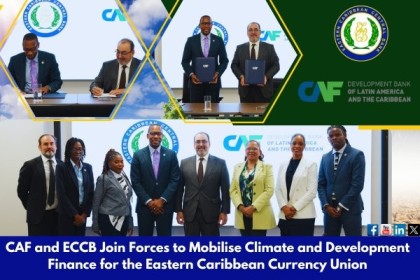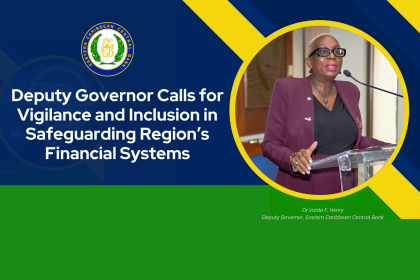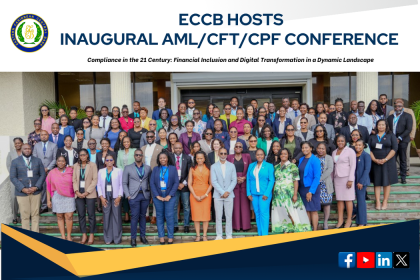
Communiqué of the 104th Meeting of the Monetary Council of the Eastern Caribbean Central Bank
The One Hundred and Fourth (104th) Meeting of the Monetary Council of the Eastern Caribbean Central Bank (ECCB) was held on 24 February 2023 at the ECCB Headquarters in St Kitts and Nevis.
1.0 Monetary Stability
Council received the Governor’s Report on Monetary and Credit Conditions in the Eastern Caribbean Currency Union (ECCU) for the period January to December 2022. The Report subtitled “A BIG Push…For Resilience, Innovation, Inclusion and Transformation” focused on the ongoing economic recovery, both globally and within the ECCU, as well as on the impact that the increased uncertainty in the global environment is having on this recovery. It indicated that:
- The global growth forecast by the International Monetary Fund for 2023 has been revised marginally upward by 0.2 of a percentage point to 2.9 per cent; in October 2022, the IMF had projected 2.7 per cent global growth for this year. This is below the historical (2000-2019) average of 3.8 per cent.
- Global headline inflation peaked in 2022, while monetary policy tightened. However, close to 84 per cent of countries are expected to have reduced headline (consumer price index) inflation in 2023 relative to 2022.
- Although the recovery is proceeding apace in the ECCU, consumer prices have not yet stabilised. Elevated consumer inflation continues to cast a shadow over positive economic activity by reducing people’s purchasing power. In the ECCU, fuel costs drove up headline inflation in 2022, and the average gasoline price in the region edged upward from the end of December 2022. Food price shocks also remain a challenge for the ECCU.
- Monetary and credit conditions in the ECCU remain stable and accommodative, and the EC Dollar – the only legal tender in the ECCU – remains stable.
- The foreign reserve backing for the EC Dollar remains strong. The average weekly backing ratio stood at 92.2 per cent in 2022, above the statutory minimum requirement of 60.0 per cent. The weekly ratio ranged from 89.4 per cent to 95.30 per cent in 2022. Since January 2023, the backing ratio (the ratio of foreign assets to demand liabilities at the ECCB) has averaged 91 per cent.
- ECCB’s foreign assets at the end of 2022 stood at $5.04 billion; the pre-pandemic (2019) level was $4.58 billion.
- The ECCU had an Import Cover Ratio (ICR) of 6.8 months at the end of 2022, relative to the 3-month benchmark.
Having considered the state of monetary, financial and credit conditions in the ECCU, the Monetary Council decided to:
- Maintain the minimum savings deposit rate at 2.0 per cent; and
- Maintain the Central Bank’s discount rate at 2.0 per cent for short-term credit and 3.5 per cent for long-term credit to governments.
The Minimum Savings Rate (MSR) is the lowest rate that commercial banks can offer on savings deposits. The Central Bank’s Discount Rate is the rate at which the ECCB lends to governments and commercial banks.
2.0 Financial Stability
The Monetary Council was advised of the following developments in the financial sector:
- Financial system stability, brought forward from 2021, was maintained throughout 2022.
- The banking system remained stable, maintaining ample levels of liquidity and solid levels of capital.
- Council was also apprised that the number and amount of moratoria loans have continued to trend downward. As at December 2022, these loans represented just 0.3 per cent of the total portfolio of the ECCU’s banking sector.
This is an important signal from the banking sector, likely reflecting improving confidence and diminishing uncertainty around the economic recovery.
Council was further apprised that the passage of critical legislation in the ECCU is just about 71 per cent complete, with Antigua and Barbuda and Grenada having passed all the requisite legislation.
In furtherance of the Council’s expressed support for uniform financial legislation in the ECCU, the Monetary Council urged:
- Enactment of the proposed amendments to the Anti-Money Laundering/Combating the Financing of Terrorism (AML/CFT) legislation to confer authority on the Eastern Caribbean Central Bank for AML/CFT supervision for its licensees, in Anguilla, Montserrat and St Kitts and Nevis.
- Enactment of the proposed amendments to the Banking Act, 2015 in Saint Christopher (St Kitts) and Nevis and Saint Lucia; and
- Enactment of the harmonised Credit Reporting Bill in Anguilla and Saint Lucia, to allow for the operation of the credit bureau regionally.
3.0 Fiscal and Debt Sustainability
The economic recovery from 2021 supported revenue growth in the ECCU and led to reductions in overall fiscal deficits.
Alongside the economic recovery, there was some progress toward the regional debt target. The ECCU governments continue to commit to reducing debt levels to 60.0 per cent of GDP by 2035. At the end of 2022, the ECCU average was 78 per cent, down from 88 per cent at the end of 2020.
4.0 Growth and Competitiveness
Council was informed that economic growth in the ECCU strengthened to an estimated 8.9 per cent in 2022, a 3.1 percentage-point improvement over the previous year when it was recorded at 5.8 per cent.
The total real value of GDP in the ECCU is expected to return to the pre-pandemic (2019) level by the end of 2023. Average annual growth in the ECCU of about 5.0 per cent is projected for 2023 and 2024. That said, this projection is highly dependent on global developments.
Economic recovery of the ECCU is being driven by Tourism, but ongoing challenges with air connectivity remain a binding constraint to faster recovery.
A sustainable recovery and faster progress for all requires strong support for initiatives at the regional level and accelerated implementation of reforms at the national level. Accelerating reforms - such as those related to innovation, financial inclusion, energy security and digital transformation, as well as increased investments in building resilience - is critical.
5.0 Update on BAICO and CLICO Issues
Council received an update on the effort by the BAICO Judicial Manager to deliver an additional payout to BAICO policyholders.
Council noted the efforts to secure funds from the Government of Barbados to make a payment to CLICO policyholders.
6.0 Change in Chairmanship of the Eastern Caribbean Securities Regulatory Commission (ECSRC)
- The Monetary Council approved the appointment of Mrs. Lucia Livingstone-Andall as the Chairman of the ECSRC.
- The Council also approved the appointment of Dr. Vincent Richards as the new Deputy Chairman of the ECSRC.
7.0 Date and Venue of the 105th Meeting of the Monetary Council
Council agreed to the convening of the 105th Meeting of the Monetary Council on Friday, 21 July 2023 in Saint Vincent and the Grenadines.
The 105th Meeting will be presided over by Honourable Camillo Gonsalves, Minister for Finance of Saint Vincent and Grenadines who will assume the chairmanship of the Monetary Council on 21 July 2023.
8.0 Welcome and Expression of Thanks
The Council welcomed its newest member, Dr Irving McIntyre, Deputy Prime Minister and Minister for Finance for the Commonwealth of Dominica; and the Council also offered its gracious thanks to former Council Member, Prime Minister Roosevelt Skerrit, who served for an unbroken 19 years.
9.0 Participation
Council Members attending the meeting were:
- The Honourable Philip J Pierre, Prime Minister and Minister for Finance, Saint Lucia (Chairman)
- The Honourable Dr Ellis L Webster, Premier and Minister for Finance, Anguilla
- The Honourable Gaston Browne, Prime Minister and Minister for Finance, Antigua and Barbuda
- The Honourable Dr. Irving McIntrye, Deputy Prime Minister and Minister for Finance for the Commonwealth of Dominica
- The Honourable Dickon Mitchell, Prime Minister and Minister for Finance, Grenada
- The Honourable Joseph Easton Farrell, Premier and Minister for Finance, Montserrat
- The Honourable Dr Terrance Drew, Prime Minister and Minister for Finance, Saint Christopher (St Kitts) and Nevis
- The Honourable Camillo Gonsalves, Minister for Finance, Saint Vincent and the Grenadines






